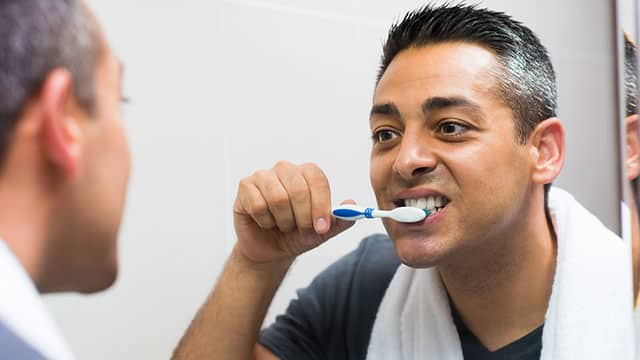What Causes Gum Irritation?
Wondering why your gums are feeling sore and inflamed? There are lots of ways your gum tissue can become irritated. Some of them, like accidental injuries, are largely outside of our control. Other causes, like gum disease, might require professional help from your dentist to treat. But in many cases, gum irritation is actually caused by a habit or behavior that we don’t realize is harmful.
This is actually good news, because it means the power to stop gum irritation is often in your hands! In these cases, healing gum irritation and preventing future irritation is simply a matter of identifying the harmful habit and making a few small adjustments. Here are four of the most common ones – do you recognize any in your daily routine?
1. Overly-Aggressive Brushing
Using excess pressure when brushing may feel like it gets your teeth and gums cleaner, but the opposite is true – aggressive brushing irritates your gums, which can leave you more vulnerable to gum recession, sensitivity, root cavities, and infection. As long as you're thorough, gentle pressure is sufficient for food and plaque removal. Use short, precise, circular strokes to clean the entire surface of each tooth. And choose soft-bristled toothbrushes, as they're best for effectively cleaning teeth without aggravating delicate gum tissue.
2. Improper Flossing Technique
Overzealous flossing is also a no-no. Avoid using strong pressure or vigorous back-and-forth movements to dislodge food and plaque, as this can lead to further gum irritation or even bleeding gums (as well as being uncomfortable).
Avoid irritating your gums while flossing with a gentle approach:
Slide the floss between the teeth and slowly move the floss back and forth.
With light pressure, move the floss gently towards the gum and around the curve of the tooth, making sure to reach any food and bacteria beneath your gum line.
Avoid pushing the floss into this area abruptly or snapping it into place, as doing so can cut or bruise your gums.
Not a fan of traditional flossing or just can’t get into the habit? Try using a water flosser, an interdental cleaning device that emits a steady stream of water to gently clean hard-to-reach places between your teeth.
3. Home Whitening Treatments
Peroxide-based agents will whiten teeth but can cause irritation if they come into contact with gum tissue. Because over-the-counter whitening strips or trays aren't designed to fit the contours of your mouth, they may allow peroxide to touch your gums.
A dental professional can help you whiten teeth at home without irritating your gum line by creating a custom-fitted whitening tray. This tray will ensure that the bleaching products only come into contact with your teeth and not the delicate tissue beneath them.
4. Dietary Choices
The foods you eat can also contribute to gum irritation. Hard candies or crunchy items like potato chips can scrape against gums and cause irritation as you chew. Can't give up the crunch? Reach for healthy alternatives like celery or carrots. According to the UIC College of Dentistry, crunchy natural foods act like teeth cleaners by stimulating saliva flow while scrubbing away bacteria and food particles.
How to Treat Irritated Gums
So you know how to prevent gum irritation in future, but what can you do right now to soothe your inflamed gums and help them heal? Here are some suggestions:
Maintain excellent oral hygiene, brushing twice a day with a soft-bristled toothbrush and flossing once a day.
Use an antiseptic mouthwash to reduce irritation bacteria.
Take a break from any whitening treatments.
Rinse with warm salt water.
Avoid irritants like tobacco, spicy foods, or acidic foods and drinks, e.g. red wine or coffee.
Avoid very hard or crunchy foods.
Avoid very hot or very cold foods or drinks.
Stay hydrated.
Michigan Medicine also lists over-the-counter painkillers, topical gels, and hot or cold compresses as helpful ideas to soothe your gums.
If your gum irritation is very painful, or it’s accompanied by symptoms like bleeding, make an appointment with a dental professional., In these cases, your gum irritation might be caused by a different oral health condition and may need professional treatment to resolve.
Irritated gums are no fun, but making small changes to daily habits can make a difference. The sooner you get to the root of the problem, the sooner you’ll be able to treat your irritated gums and get back to a pain-free, confident smile.
This article is intended to promote understanding of and knowledge about general oral health topics. It is not intended to be a substitute for professional advice, diagnosis or treatment. Always seek the advice of your dentist or other qualified healthcare provider with any questions you may have regarding a medical condition or treatment.
ORAL HEALTH QUIZ
What's behind your smile?
Take our Oral Health assessment to get the most from your oral care routine
ORAL HEALTH QUIZ
What's behind your smile?
Take our Oral Health assessment to get the most from your oral care routine
Join Us
Get the best of your oral health routine and take it to the next level with expert advice, recommendations, products and solutions and special offers.
Join Us
Get the best of your oral health routine and take it to the next level with expert advice, recommendations, products and solutions and special offers.















